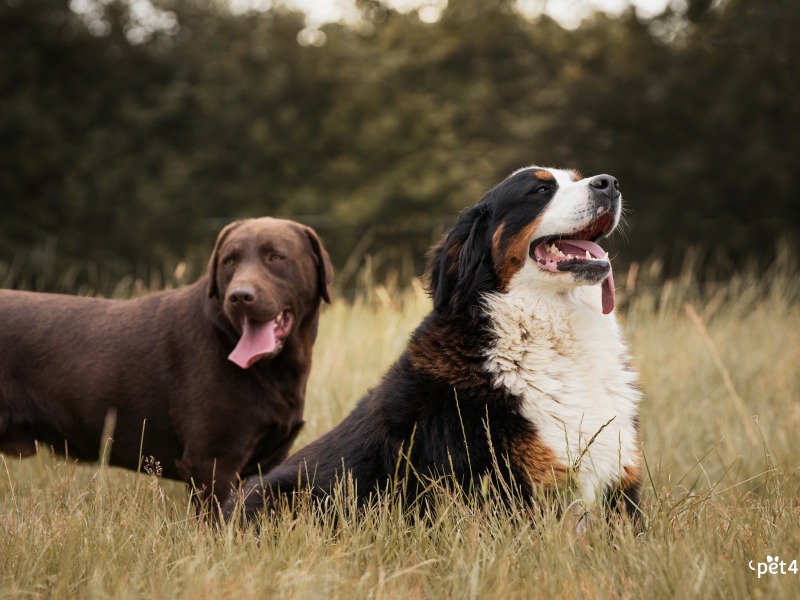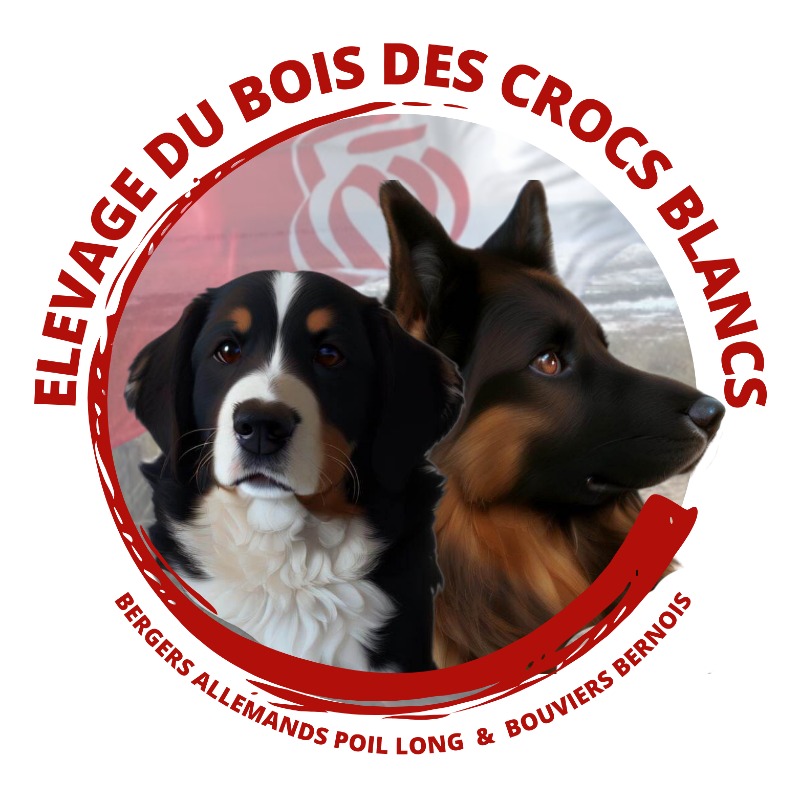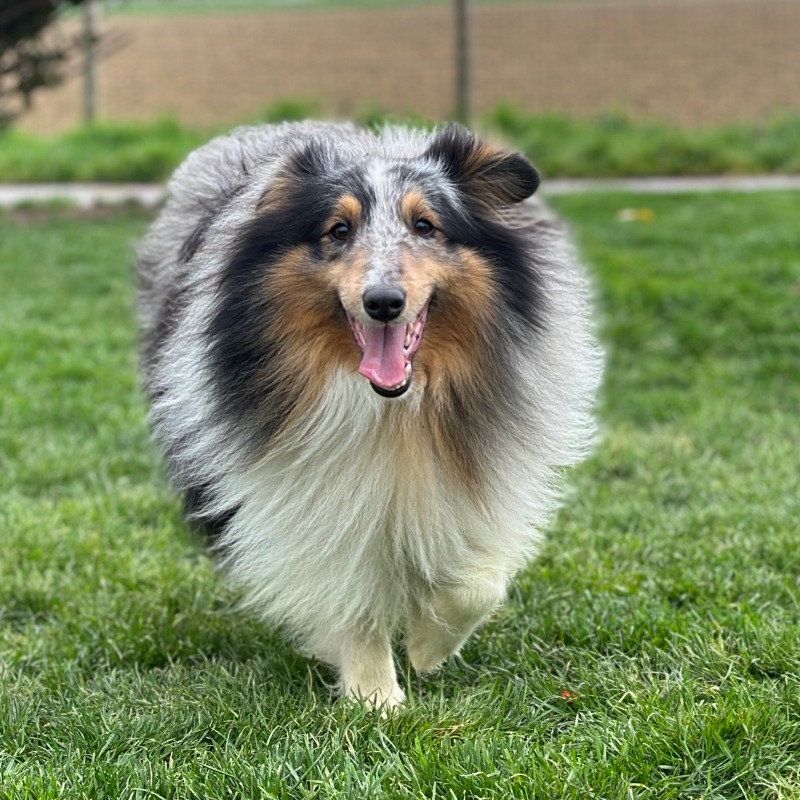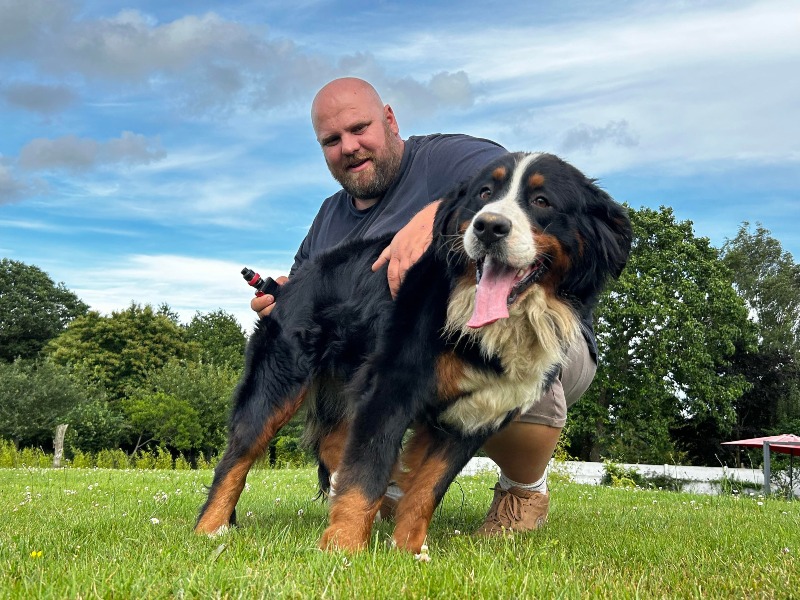Bernese mountain dog
Welcome to our page dedicated to the breed of dog bernese mountain dog!
Here, you will find all the useful information about bernese mountain dog. This descriptive profile will allow you to discover the aspects of this breed. You can notably consult information about the average price, monthly and annual upkeep expenses, their health, name ideas, as well as their official recognition by competent authorities.
Explore this page to discover everything you need to know.
Overall description of the breed
The Bernese Mountain Dog, also known as the Berner Sennenhund, is a breed of dog that originated in Switzerland. With its imposing appearance and friendly temperament, it has become one of the most popular breeds in the world. In this article, we explore the fascinating history, morphology and character of the Bernese Mountain Dog.
The Bernese Mountain Dog has a long history as a working dog in the mountainous regions of Switzerland. The breed's ancestors were used by farmers to herd livestock, pull carts and carry out various agricultural tasks. The breed is thought to have evolved from crosses between local mountain dogs and cattle dogs imported by the Romans centuries ago. The Bernese Mountain Dog has been particularly popular in the Bern region, from which it takes its name.
Bernese Mountain Dogs are large, muscular dogs. Males generally measure between 64 and 70 centimetres (25 to 27.5 inches) at the withers, while females measure between 58 and 66 centimetres (23 to 26 inches). Their average weight varies from 40 to 50 kilograms (88 to 110 pounds). They have large, expressive heads with almond-shaped eyes and rounded triangular ears. Their coat is thick, long and glossy, with distinctive tricolour markings: black, white and tan.
Bernese Mountain Dogs are renowned for their gentle, friendly and affectionate temperament. They are extremely loyal to their families and enjoy spending time with them. Despite their imposing size, they are often described as gentle giants. They are naturally protective and can be wary of strangers, making them good watchdogs. Bernese Mountain Dogs are also known for their patience with children and their ability to adapt to different environments. They are highly intelligent and generally easy to train.
The Bernese Mountain Dog breed standard was established in 1907 by the Swiss Bernese Mountain Dog Club. This standard defines the breed's physical characteristics, temperament and distinctive features. In terms of official recognition, the Bernese Mountain Dog was definitively recognised by the FCI on 26 July 1954. It is classified in group 2 "Pinscher- and Schnauzer-type dogs - Molossoids and Swiss mountain and cattle dogs" according to the FCI classification.
In conclusion, the Bernese Mountain Dog is a magnificent, versatile dog that is both a hard worker and a loyal companion. With its impressive appearance, friendly character and protective nature, it has become a popular choice among families and dog lovers around the world. Whether it's herding cattle, pulling carts or simply providing a loving presence for his family, the Bernese Mountain Dog is a remarkable dog that brings joy and happiness to those lucky enough to have him around.
Awareness of acquiring an animal
Each animal is a sensitive being, deserving love, attention and care.
When you choose to adopt an animal, you take on the responsibility of ensuring its health and well-being throughout its life.
To learn more about animal welfare, we invite you to consult our FAQ by clicking the button below:
Origins
The Bernese Mountain Dog is a breed of dog originating from the region of Bern, in Switzerland. Its ancestors were used as versatile farm dogs, mainly assisting in the transport of milk and cheese, as well as guarding herds and properties. These sturdy dogs were highly valued for their endurance and ability to work in the difficult mountainous conditions of the region. The breed has evolved over the centuries to become a reliable companion dog, while retaining its working instincts. Bernese Mountain Dogs are descendants of Roman molossus, introduced to Switzerland by the Roman legions. Today, they are known for their gentle temperament and imposing yet charming appearance.
History
The Bernese Mountain Dog was officially recognized as a distinct breed at the beginning of the 20th century. In 1902, the breed was first presented at a dog show in Berthoud, Switzerland. In 1907, the first breed club for the Bernese Mountain Dog was founded, establishing strict standards for breeding and preserving the breed. The popularity of the Bernese Mountain Dog quickly spread beyond Swiss borders, reaching the United States and other European countries. During World War II, the population of Bernese Mountain Dogs decreased, but concerted breeding efforts helped restore the breed. Today, the Bernese Mountain Dog is valued for its friendly nature and role as a family dog.
Standard
The Bernese Mountain Dog is a large, well-proportioned and sturdy dog. According to the standards of the Fédération Cynologique Internationale (FCI), males measure between 64 and 70 cm at the withers, while females measure between 58 and 66 cm. The weight generally varies from 40 to 50 kg for males and 30 to 45 kg for females. The Bernese Mountain Dog's coat is thick, of medium length, with a dense undercoat, suitable for cold climates. The coat colors are tricolor: black with tan marks above the eyes, on the cheeks, legs, and chest, and white marks on the head, chest, and tip of the tail.
Physical characteristics
The Bernese Mountain Dog is a large breed with an imposing stature. Males measure between 64 and 70 cm at the withers and females between 58 and 66 cm. Their weight ranges from 40 to 50 kg for males and 30 to 45 kg for females. Their coat is thick, of medium length, with a dense undercoat, which allows them to withstand cold climates. Their coat is tricolored: black with tan markings on the cheeks, above the eyes, on the legs and chest, and white markings on the head, chest, and tip of the tail. Their tail is bushy and carried low.
Character
The Bernese Mountain Dog is known for its gentle and affectionate nature. They are naturally kind, loyal, and very attached to their family. These dogs are usually patient and tolerant, making them excellent companions for children. They are also intelligent and eager to please, which makes training them easier. Although they can be protective, they are not aggressive and prefer to avoid conflicts. Their social nature also makes them compatible with other pets. The Bernese Mountain Dog requires a lot of attention and does not tolerate loneliness well. A loyal and loving companion, they are always ready to share moments of tenderness and play with their loved ones.
Life expectancy
The Bernese Mountain Dog's life expectancy is unfortunately relatively short compared to other dog breeds. On average, they live between 7 and 10 years. This limited longevity is partly due to a genetic predisposition to certain diseases, such as hip and elbow dysplasia, as well as various types of cancers, including malignant histiocytosis. To maximize their life expectancy, it is crucial to provide them with regular veterinary care, a balanced diet, and an active lifestyle. Good genetics, resulting from responsible breeding, can also play an important role in extending the life of a Bernese Mountain Dog.
Exercise and activity needs
The Bernese Mountain Dog needs a lot of exercise to stay healthy and happy. Although not hyperactive, they benefit from daily walks of at least an hour, as well as interactive games and time spent outdoors. They particularly enjoy outdoor activities such as hiking, canicross, or simply running in a large garden. These sturdy dogs also enjoy tasks that stimulate their minds, such as obedience training, agility, or pulling work. Bernese Mountain Dogs need mental and physical stimulation to prevent boredom and destructive behavior.
Recommended diet
The Bernese Mountain Dog requires high quality food, tailored to their age, weight, and activity level. On average, an adult Bernese Mountain Dog consumes between 3 and 5 cups of dry food per day, split into two meals. A diet rich in proteins and healthy fats is essential to maintain their muscle mass and energy levels. Monthly costs for feeding a Bernese Mountain Dog range from 70 to 120 euros, depending on the quality of food and each dog's specific needs. It is recommended to consult a veterinarian to determine the most suitable diet.
Training and obedience
The Bernese Mountain Dog is an intelligent and eager-to-please dog, making them relatively easy to train. Training should start at a young age, with early socialization to get them accustomed to different environments, people, and animals. Positive reinforcement methods, such as rewards and praise, are particularly effective with this sensitive breed. It is crucial to be patient, consistent, and gentle during training. Bernese Mountain Dogs respond well to basic obedience training, and some may excel in activities such as agility, tracking, and therapy work. Well-led training ensures a balanced and happy dog.
Behavior with children
The Bernese Mountain Dog is often described as an ideal family dog, largely due to its exceptional behavior with children. These dogs are naturally gentle, patient, and protective, making them particularly well-suited for families with young children. They tolerate rough play from children and rarely show signs of aggression. However, due to their large size and strength, it is important to supervise interactions between a Bernese Mountain Dog and very young children to avoid unintentional accidents. Early socialization and good training also help strengthen their compatibility with children.
Compatibility with Other Animals
The Bernese Mountain Dog is generally very sociable and gets along well with other pets, including other dogs and cats. Their gentle and friendly nature allows them to peacefully coexist with various animals, as long as they are properly socialized from a young age. Initial introductions should be done gradually and under supervision to ensure that all animals adapt well to each other. Bernese Mountain Dogs can sometimes show guarding behaviors towards their family, but this generally does not translate into aggression towards other animals. With proper socialization, they become excellent companions for other pets.
Grooming needs
The Bernese Mountain Dog has a thick, double coat that requires regular maintenance to stay in good condition. Weekly brushing is recommended to avoid tangles and remove dead hair. During shedding periods in spring and autumn, more frequent brushing, even daily, is necessary to manage abundant hair loss. Ears should be checked and cleaned regularly to prevent infections, and nails should be trimmed every month. A bath every two to three months is sufficient to keep their coat clean. Regular grooming also helps monitor the appearance of parasites or skin problems.
Health
The Bernese Mountain Dog is prone to several genetic health issues, which require special attention and regular veterinary care. Common conditions include hip and elbow dysplasia, bloat, various types of cancer, particularly malignant histiocytosis. Bernese Mountain Dogs may also suffer from eye diseases, such as progressive retinal atrophy. It is crucial to choose a reputable breeder who conducts rigorous health tests on their breeding dogs to minimize these risks. Regular visits to the veterinarian and a healthy lifestyle help detect and treat health issues promptly.
Average price
The price of a Bernese Mountain Dog puppy can vary depending on several factors, including the breeder's reputation, the quality of the parents, and the geographical location. Generally, the price of a puppy ranges between 1000 and 2000 euros. For a puppy from champion lines or with high-quality pedigrees, the price can reach 3000 euros or more. It is important to note that buying a puppy from a reputable breeder, who conducts health tests and offers guarantees, often justifies a higher cost, but also ensures a healthier and well-socialized puppy.
Expenses
The average monthly expenses for a Bernese mountain dog can vary significantly, but typically include food, veterinary care, health insurance, and accessories. The cost of high-quality food ranges between 70 and 120 euros per month. Veterinary care, including vaccines and parasite treatments, can cost between 20 and 50 euros per month. Health insurance, while optional, can add between 30 and 50 euros monthly. By adding accessories such as toys, beds, and grooming items, total monthly expenses for a Bernese mountain dog range between 150 and 250 euros.
Name ideas
The names for a Bernese Mountain Dog should reflect their noble appearance and gentle temperament. Here are some suggestions: Bernie, Heidi, Max, Bella, Zeus, Luna, Bruno, Rosie, Thor, Elsa, Rocky, Daisy, Odin, Mila, Rufus. These names are both classic and unique, fitting well with the charming personality and imposing stature of the breed. Choosing a short and easy-to-pronounce name is also practical for training and daily communication. Bernese Mountain Dogs respond well to names that include clear and distinct sounds, making it easier for them to recognize and learn.
Legislation and regulation
In France, the Bernese Mountain Dog is not among the breeds of dogs classified as dangerous, according to the law on category dogs. This means that it is not subject to any specific strict regulations. However, as with all dogs, it is mandatory to declare it to the town hall of your municipality if it causes an incident. Owners must also respect local rules regarding leash holding in public places and picking up dog feces. It is important to check local regulations, as they may vary from one municipality to another. In addition, a European pet passport is required to travel abroad with your dog.
Official recognition
The Bernese Mountain Dog is recognized by many cynological organizations around the world. In Switzerland, its country of origin, it is recognized by the Swiss Cynological Society (SCS). In France, the breed is officially recognized by the Central Canine Society (SCC). In the United States, the Bernese Mountain Dog is recognized by the American Kennel Club (AKC). In Great Britain, it is recognized by the Kennel Club (KC). The Fédération Cynologique Internationale (FCI) also recognizes this breed, assigning it the standard number 45. This global recognition allows Bernese Mountain Dogs to participate in international dog shows and competitions.
Pedigrees
Pedigrees for Bernese Mountain Dogs are issued by various breed clubs around the world, guaranteeing the purity and quality of the bloodlines. In France, the Société Centrale Canine (SCC) issues pedigrees under the name "Livre des Origines Français" (LOF). In Switzerland, pedigrees are managed by the Schweizerische Kynologische Gesellschaft (SCS). In the United States, the Bernese Mountain Dog Club of America (BMDCA) is the breed club recognized by the American Kennel Club (AKC). In Great Britain, the Kennel Club (KC) issues pedigrees. These clubs ensure the health, temperament, and adherence to the breed standards through rigorous breeding programs.
Destination and usage
Historically, the Bernese Mountain Dog was used as a working dog on Swiss farms, where it pulled carts, herded livestock, and protected property. Today, although it is still capable of fulfilling these roles, it is mainly appreciated as a companion dog because of its affectionate and loyal nature. Bernese Mountain Dogs also excel in various canine sports such as agility, tracking, and pulling work. Their gentle and patient nature makes them excellent therapy and emotional support dogs. They are also often used in search and rescue roles thanks to their intelligence and robustness.
Prohibitions
There are no specific restrictions regarding the ownership of a Bernese Mountain Dog in France or in most countries. However, as with all dogs, owners must comply with local regulations regarding animal welfare and public safety. This includes keeping the dog on a leash in public places, picking up excrement, and preventing nuisances. Bernese Mountain Dogs are not classified as dangerous dog breeds, so they are not subject to the strict restrictions imposed on category 1 and 2 dogs in France. It is always advisable to check the specific regulations of your region or country.
Breeders of Bernese mountain dog
Want to see more breeders of Bernese mountain dog?
Check out the page of our directory listing all breeders of Bernese mountain dogClassified Ads of bernese mountain dog
No of bernese mountain dog classified ads are available on Preeders.
If you’re a breeder, sign up for free now and be the first to post a classified ad
Breed clubs of bernese mountain dog
No of bernese mountain dog breed clubs are currently registered on Preeders.
If you would like to highlight your breed club, sign up for free now and be the first to appear on this page.








